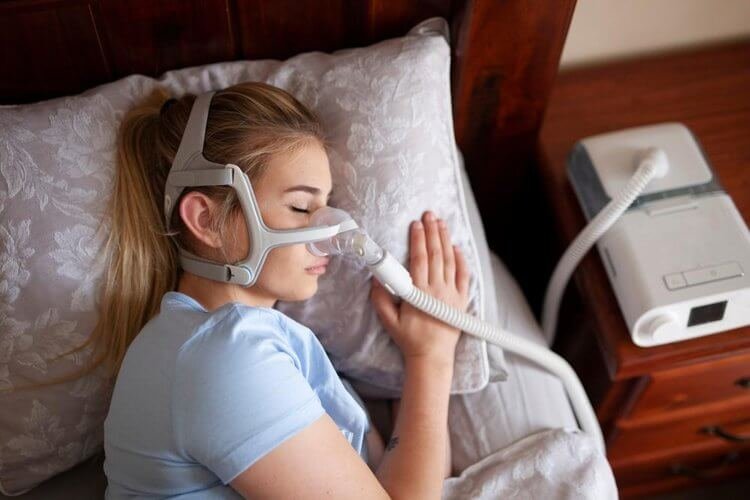How does a CPAP machine help sleep apnea?
Are you or someone you know suffering from sleep apnea? Sleep apnea is a serious sleep disorder where your breathing repeatedly stops and starts whilst you’re asleep. If left untreated, sleep apnea can lead to other serious health complications.
Continuous Positive Airway Pressure (CPAP) therapy is a common treatment designed to help sleep apnea sufferers breathe easier whilst asleep.
How a CPAP machine works
A CPAP machine consists of a hose, mask or nosepiece to deliver constant steady air pressure through your nose and mouth to prevent your throat from collapsing. It does so by stopping the soft palate, uvula, and tongue from moving into the airway (this also reduces the vibration that creates the sound of snoring).
The air is passed through a heated humidifier and into a flexible tube, which delivers purified air into a mask that is covered around your nose or mouth.
The pressurised air reduces swelling within the nose and clears out mucus along the airway. This removes any throat blockages and increases oxygen to the lungs, normalising your breathing.
Components of a CPAP machine
CPAP machines may come with different mask types. However, all devices share the following components:
The flow generator - this is the main component of the machine and it is responsible for providing the airflow pressure
The hose - this part is in charge of connecting the interface with the flow generator
The interface - this is the part that you place over your face. The most common interfaces are CPAP nasal masks, nasal pillows and full face masks (more about this below)
Different mask types
Mask styles vary. The type you choose depends on your breathing habits, how comfortable the mask is on your face, and the type of sleep apnea disorder you have.
The following are the different types of CPAP masks:
Nasal pillow mask - this type of mask consists of small cushions that seal at the base of the nostril and is held in place with a stretchy strap that goes around the back of your head. This mask enables you to wear your glasses comfortably and works well if you have lots of facial hair that may not fit well within a larger mask.
Nasal mask - this is a cushioned mask that covers your whole nose area from the bridge down to your upper lip. It may be a suitable alternative if you tend to move around in your sleep.
Full mask - this mask is shaped like a triangle and covers your mouth and nose. It is often prescribed by doctors for those that breathe through their mouth when they sleep or have some kind of blockage in the nose.
Benefits of CPAP machines
The clear benefit of the CPAP machine is its ability to treat serious sleep apnea disorders and help the body breathe properly during sleep. Ongoing use of the CPAP machine may also come with other health benefits:
Improved quality of sleep due to fewer sleep disruptions, and reduction in daytime fatigue
Significant reduction to the risk of heart attacks, strokes or other cardiovascular events
Lowered blood pressure
Lowered levels of blood glucose and cholesterol
Other considerations
Despite the many benefits of a CPAP machine, there are also some key considerations that you may want to weigh up before choosing this treatment.
Some people may experience the following side effects:
Struggling to fall asleep due to the discomfort of the equipment
A sense of claustrophobia or anxiety whilst using the CPAP machine
Nasal congestion
Dry mouth
Nosebleeds
Skin irritation or sores where the mask touches the face
A feeling of being bloated with air
Key takeaway
Although CPAP machines come with many benefits, it is important to ensure it is the right treatment for you. If you’re experiencing sleep apnea, it’s recommended you speak with a health professional to determine the right treatment.
IF YOU’RE EXPERIENCING PERSISTENT DISRUPTIONS TO YOUR SLEEP, CONSULT WITH A PHARMACIST OR TRUSTED MEDICAL PROFESSIONAL TO DISCUSS POSSIBLE SOLUTIONS.
Any advice provided in this content is of a general nature and does not take into account your objectives, health or needs. The information in this post is not intended to substitute medical advice, diagnosis or treatment and should not be exclusively relied on to diagnose or manage a medical condition. You need to consider the appropriateness of any information or general advice we give you, having regard to your personal situation, before acting on our advice or purchasing any over-the-counter sleep product.

